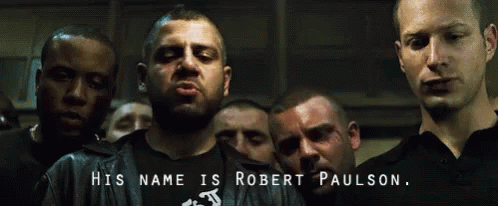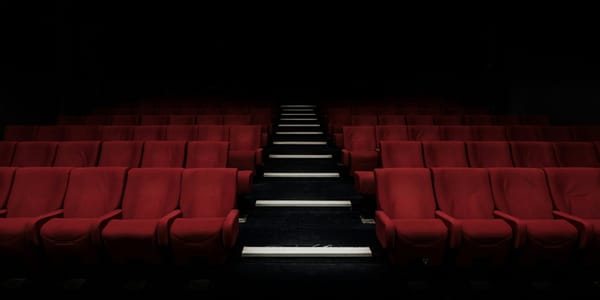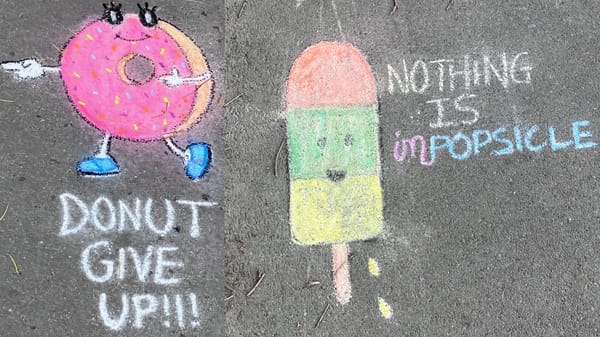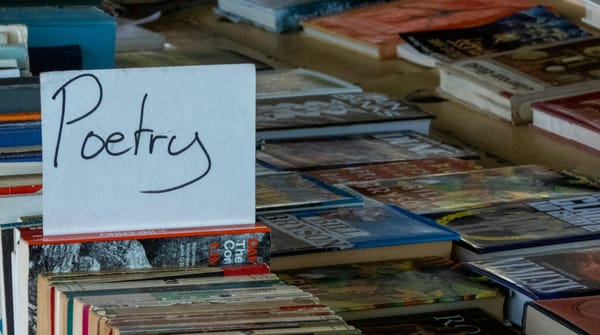The Neverending Story: Childhood trauma revisited as an adult
What happens when you go back and watch, as an adult, the film that scarred a generation of children? Philosophy, giant boobs, and a way through despair.

I recently re-watched kids' classic, The Neverending Story, with my ten year old son. It's a film I'd been wanting to watch with him for some time but he's a sensitive soul and I'm still carrying enough childhood trauma from watching this film that when I saw the advertisement below for a pot plant ornament a few months back I was still internally screeching "TOO SOON!!!".

(As an aside, I showed this image to one of my workmates and exactly zero emotions played across his face. But it's okay, he's not actually a sociopath, he's just slightly too young to have been scarred by this. Phew.)
So, I was worried that he might be a bit upset (but also that I might be a bit upset1). Unlike a lot of 80s favourites (Willow, The Princess Bride etc) I haven't watched The Neverending Story since I was a kid so my memories of it (other than the troubling ones seared into my emotional core) were a little vague and I was curious to see how, or if, it would hit differently for me now.
Watching as an grown-up was a revelation
As a child The Neverending Story is a rollicking kids' fantasy adventure. As an adult it works on that level but also as something far deeper and more philosophical. I had moments watching this film where my eyes widened and my brain quietly scream "HOLY SHIT". But then, I was also seeing my kid's reactions to the same thing which really emphasised how the movie is operating on multiple levels at once.
Let's dive in.
Immediately there's an aesthetic
I'm fairly confident that when I watched this movie the first time, I wasn't thinking "well, this is very European" within seconds of the opening credits starting. I don't know at what point in the last 40 years I developed an eye for "stuff that looks a bit weird and was therefore created by someone from a country that participates in Eurovision" but it's safe to say that has happened. I mean, just look at this distorted, moody, atmospheric roiling cloud.

Directed by Wolfgang Petersen, who is famously German (Das Boot, anyone?) what I didn't know about the film at the time was that the source novel was also German. So yeah, there's a "sensibility" to the film that I definitely didn't pick up on as a kid.
Major Dad Fail
One thing I definitely did pick up on as a child was that Gerald McRaney's "Dad" character sucked. As an adult and a parent it's even more evident what a crappy parenting job he is doing. He invalidates his child's feelings, doesn't listen to him, and basically tells Bastian to suck it up... about his mother being dead. REPRESSED EMOTIONS, MUCH?
My child's takeaway from this scene? In the 1980s people would put a raw egg into a blender with some juice and drink it.
Is the egg actually a metaphor for Bastian's dad's emotions? Just blitzing the fuck out of all the feelings and drowning them in OJ before heading off to work?

It also breaks my heart a little bit to see this child making his sandwiches for school. Not because there's anything wrong with a ten year old making their own lunch. It's just I get the feeling that his mum probably would have done this for him but now that she's gone (and his dad is clearly not stepping into the caretaker role) he's expected to fend for himself.
Also, how grim and lacking in life or colour is that kitchen? If the kitchen is the heart of a home then this home is dark, uninspiring, and lacking warmth. Poor Bastian.
Stranger danger
Another thing that definitely comes across differently is the scene in which Bastian comes into possession of the book that contains the neverending story.
When I say that my parental "creepy stranger" radar was going off, oh lawd.
Watching this as a kid, I didn't find anything particularly off-putting about it but as an adult it's all VERY WRONG. The bookseller even "beckons" Bastian at one point and says that this book isn't "safe".
Coreander: Look. Your books are safe. While you're reading them you get to become Tarzan or Robinson Crusoe.
Bastian: But that's what I like about them.
Coreander: Yes, but afterwards you get to be a little boy again... Forget about it. This book is not for you.
The man is positively radiating "groomer" vibes. Those, are "sex offender" spectacles if ever there were any.

But of course, he isn't one. There is no danger here. But it's so on the nose I can't help but think that this creepy scene was thrown in as a little anxiety treat just for the mums and dads. I felt like turning to my child and telling him that if an old man offers him reading material that will remove him of his childhood innocence that he should run away very quickly...
The swamp of sadness
Oof. So here we are at the place where the Bad Thing happens.
The first thing that surprised me about this scene is how early it is in the film. I remember being so devastated by it that I assumed that we'd spent quite a bit of time with Atreyu and Artax, but Artax only has, and I swear I'm not exaggerating, about 6 minutes of screentime in the whole film. We first see Artax and Atreyu riding across a desert landscape at about 26 minutes in and by minute 33 he's gone.
I think this is a testament to the anguished performance by Noah Hathaway as Atreyu. His screams are real screams. His pleading is real pleading. It doesn't feel like acting. Perhaps Wolfgang Petersen was torturing this poor child somewhere off camera, all I know is that's it's completely believeable.

Also, there's some great, moody and yes, quite European, synth soundtracking this scene. It all just feels grim and despairing. And apparently, it still gets to me a bit if the following exchange is at all illustrative.
Kiddo: I feel sorry about the sad swamp horse.
Me, just a touch too snippily: His name is Artax.

So far, so re-traumatised.
But here's the message that I never got as a kid but which as an adult is a flashing neon sign. And it comes in Artax's last moments as Atreyu begs for him to save himself:
Come on! Artax! Fight against the sadness, Artax. Artax, please, you're letting the sadness of the swamps get to you. You have to try. You have to care, for me, you're my friend, and I love you.
...I won't give up! Don't quit! Artax! Please!
Because this basic sentiment is one that I've expressed recently, that we shouldn't let despair get to us. That you have to keep caring even when it feels stupid to. Because giving in can have quite bad consequences for us and world around us.
Ohmigod.... am I Atreyu?!!
I was very much not expecting this.
It's turtles all the way down
The scene that follows in which Atreyu finds Morla, the ancient one, a giant turtle creature, gets even more philosophical, by which I mean "circular and confusing".
Atreyu climbs Shell Mountain the supposed home of Morla, the ancient one, only to find that Morla is the hill, and I'm rapidly coming to the conclusion that yes, this is the sort of kids' film that would make an offhand allusion to the World Turtle.
I read a comment somewhere2 recently in which someone was basically saying that the thing about Germans is they love to discuss philosophy and Germany is basically the only place in the world where you could go to a party and find a group of people casually standing around discussing Heidegger.
I guarantee you that somewhere, someone with a degree in philosophy is currently being as infuriating as Morla, the ancient one.
Atreyu: Are you Morla, the ancient one?
Morla: Not that it matters but yes.
Atreyu: If I don't save her, she'll die! There's a terrible nothing sweeping over the land. Don't you care about that?!
Morla: We don't even care whether or not we care.
Atreyu: If you don't tell me and the nothing keeps coming, you'll die to! Both of you!
Morla: Die? That at least would be something.
At this point, young Atreyu, the undergrad, is starting to regret signing up for PHIL 101. Perhaps he should have done beginners' French instead... but perhaps there is a way out of this yet...
Morla:...go away. Nothing matters.
Atreyu: That's not true. If it didn't really matter to you then you'd tell me.
Morla: Hah hah, clever boy.
Atreyu perks up. Perhaps he will get some credits from this paper after all...
Suffice to say, I was not imagining any of this when I was watching this as a child, exasperating conversations with "philosophers" being more of an early twenties phenomenon.
This child is now a missing person
Shortly afterwards, in the real world with Bastian, the school bell rings indicating the end of the school day. Instead of heading home, to a place where he'll likely be told to "walk off" his emotions, Bastian stays at school to continue reading the book. At this point kiddo was concerned, asking "won't his dad wonder where he is?" and my answer "I would hope so" was underpinned by a small frisson of anxiety about what that would feel like as a parent.
A strange thing that I'd fabricated from my viewing of this film as a child was that there was some kind of reconciliation between Bastian and his father at the end of this movie. I don't know if I've confused it with a scene from another film, but that one scene at the beginning is all we ever see of Bastian's surviving parent. I think it's very telling that I've falsely remembered an additional scene to somehow make the parent-child relationship a more satisfying one. Perhaps it's just because it's a bit of a trope in kids' films and that's why I inserted it in there? In any event, I certainly hope Bastian's dad was chewing up the scenery and madly calling all the hospitals when his son didn't come home from school.
Not quite as special effects
My kid is ten and Jurassic Park level special effects are old hat to him so I guess it's not so much of a surprise that he wondered aloud what this film would look like if it were remade today3.
Falcor the luck dragon is rather... quaint looking to modern eyes but by 1984 standards this was all pretty cool, as I recall.
I don't think there's any subtext here, it's just bewbs


EU. RO. PEANS.
Hold up. Is this movie an Anti-fash manifesto?
Towards the end of the film there's a confrontation between Atreyu and G'mork, a scary wolf-like creature that's been stalking him. I had completely forgotten this bit of the film existed, so imagine my surprise when it kind of lays out the whole point of the thing, which isn't what I thought it was at all.
Atreyu: What is the nothing?!
G'mork: It's the emptiness that's left. It's like a despair, destroying this world. And I have been trying to help it.
Atreyu: But why?
G'mork: Because people who have no hopes are easy to control. And whoever has control has the power.

Um. Excuse me? I think this kids' movie just unpacked fascism and... yeah, I get why this is a German story, I guess... [sits very quietly and processes]
Dare to dream
And, of course, the answer to this is radical hope. The answer is a small, downtrodden boy who has no power over anything scraping up enough belief in himself to make the world new.
Bastian: All right, I'll do it. I'll save you. I will do what I dream!
Fuck me, that's actually really moving. That's actually what I needed to here and believe and feel.
When I was a kid I just thought this movie was about a lonely boy who got to go on an adventure, and it is but it's so much deeper and more disturbing and meaningful than just that.
So there you have it, philosophy, giant stone boobs, anti-fascism, and ultimately... hope.
Now go do what you dream!
- It is spoken amongst the tribe of people known as "Gen X" that The Death of Artax is one of the collective pains that we all must carry.
- Sorry to be so vague but I could have read this almost anywhere. I usually have upwards of 20 tabs open.
- I had no idea when I started writing this but apparently Michael Ende who wrote the book and HATED the movie has just announced a remake.




